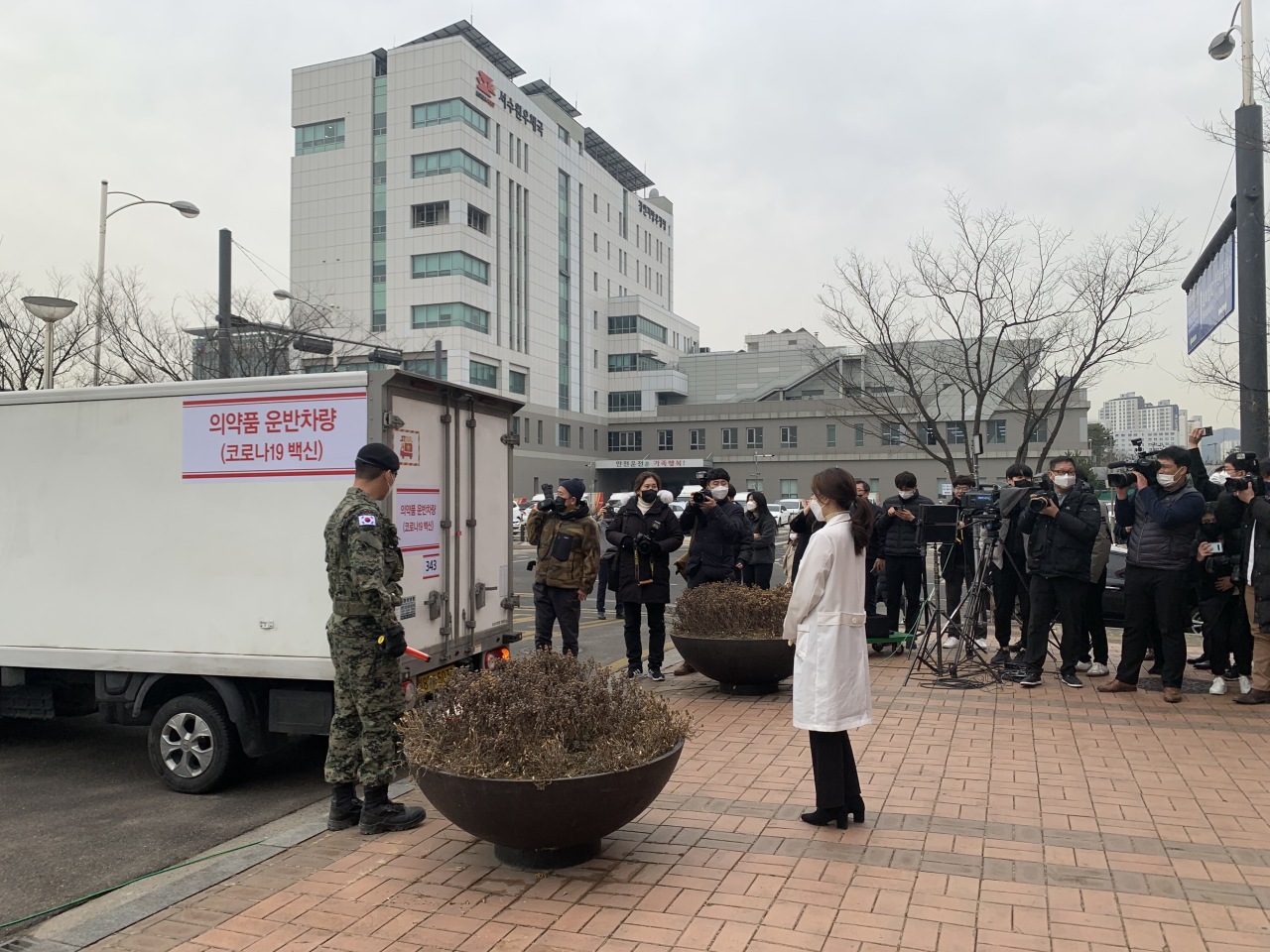SUWON, Gyeonggi Province -- Korea’s first COVID-19 vaccines are being dispersed across the country, ready for Friday’s rollout.
The delivery of the first batch of the AstraZeneca vaccine began Thursday morning. Over the next four days, more than 1 million doses of the vaccine are expected to be doled out to at least 1,900 public health centers and nursing homes.
Before the vaccines could reach the vaccination sites, they had been transported from a SK Bioscience plant in North Gyeongsang Province to a distribution center near Seoul the night before. The pharmaceutical company is manufacturing COVID-19 vaccines from AstraZeneca and Novavax.
At a public health center in Suwon’s southwestern district of Gwonseon, AstraZeneca vaccines for 500 people arrived in a truck escorted by police and military. Under tight security, officers handed the box containing the center’s allotted share to medical staff, who examined them for possible defects.
Staffers told reporters at the scene the vaccines came intact and were being kept in special refrigerators equipped with temperature sensors. The sensors would alert the personnel in charge in the event the temperature deviates from the recommended range of 2 to 8 degrees Celsius.
The center’s director Woo Tae-ok said she was confident that vaccinations would go smoothly.
“Public health centers run very successful mass vaccination campaigns annually. Our staff are well-trained for the occasion,” she said.
For those unable to come to designated centers themselves, like many senior residents at nursing homes, vaccination teams will be dispatched to administer the shots to them. Each team will comprise a doctor, a nurse and two assistants.
Woo said willigness to get vaccines appeared high. So far, about 460 people eligible for the first doses have signed up.
“We’ve had people come up and inquire about their turn for the COVID-19 shots. Many look to the vaccines as the first step toward a normal life. So this is a very exciting day for us,” she said.
She said there were “understandable concerns”‘ about the new vaccines, and that it was the job of public health authorities such as herself to give people the needed assurance. “At our center all the vaccinees will be closely monitored for any discomfort or side effects, and tended to immediately.”
Some of the vaccines almost couldn’t make it to their destination. The 3,900 doses that were supposed to go to Jeju Island were exposed to unsafe temperatures on the way and had to be withdrawn. In the ensuing inspection, health officials decided not to discard the doses in question, saying the length of exposure “isn’t too significant.”
Another shipment set off following the incident and Jeju Island was able to get its quota of vaccines in time.
The Korean government has decided not to officially designate any “first COVID-19 vaccine recipients” in Korea.
In a message to reporters, health officials said over 5,000 nursing home residents and workers younger than 65 will be receiving the AstraZeneca vaccines Friday morning all at the same time.
“The coming days will be about the vaccines being rolled out safely and efficiently, rather than who gets them ahead of others,” they said.
The press has been invited to a public health center in the northern Seoul district of Dobong on Friday, which is one of many vaccination locations that will be administering the very first shots.
COVAX, a World Health Organization project for global vaccine equity, is also shipping 117,000 doses of Pfizer vaccines to Incheon around noon Friday. These jabs will be going to front-line workers taking care of patients with COVID-19 starting the next day.
Police say they are activating the highest level of security to guard the coveted vaccines and health care personnel who handle them. Those who assault vaccination workers would be taken into custody for criminal investigation, police said Thursday.
Meanwhile, as cases creep upward once again, the government is to announce whether to restore tighter social distancing regulations Friday or Saturday, less than two weeks since they were eased on Feb. 15.
By Kim Arin (
arin@heraldcorp.com)







![[Today’s K-pop] Blackpink’s Jennie, Lisa invited to Coachella as solo acts](http://res.heraldm.com/phpwas/restmb_idxmake.php?idx=644&simg=/content/image/2024/11/21/20241121050099_0.jpg)
